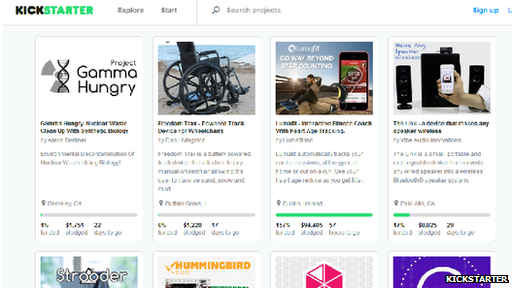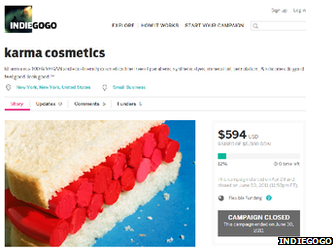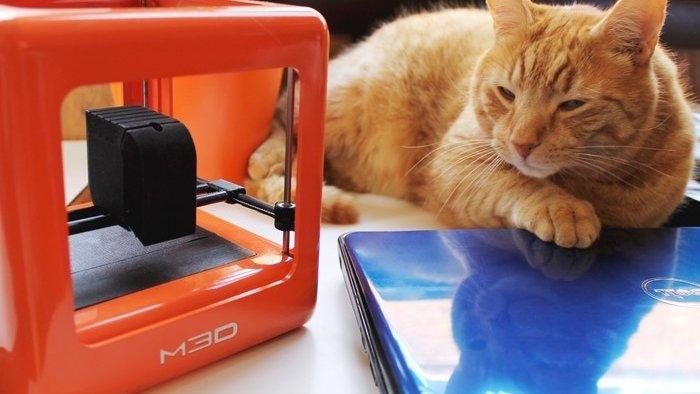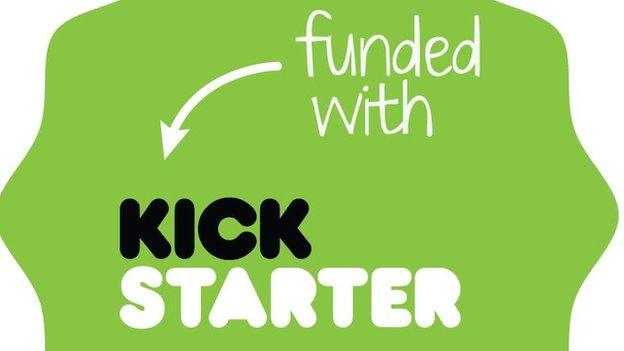Kickstarter relaxes crowdfunding project rules
- Published

Kickstarter will allow more types of projects to be listed on its site
Crowdfunding site Kickstarter has relaxed its rules about which projects can be placed on its site.
The change ends outright bans, external on cosmetics, eyewear, electronic surveillance equipment and all health, medical and safety products.
However, weapons, drugs, pornography and political fundraising remain prohibited, external.
The New York-based firm said it wanted to "simplify" its rules. The move may also help it compete against rivals.
Alternatives, including Indiegogo, external and UK-based GoGetFunding, external, ban illegal and deliberately misleading projects, but otherwise take a more relaxed policy.
"Indiegogo's 'open-door' policy does have some drawbacks but it has proved that crowdfunding has much wider applications than the rather narrow rules which Kickstarter has had until now," said Barry James, founder of the UK-based Crowdfunding Centre advisory service.
"It's also shown that it's open-by-default nature helps enormously in the evaluation of projects and the early detection of any attempted fraud."

Indiegogo allowed cosmetics start-ups on its site when they were banned on Kickstarter
However, Nesta - an innovation-focused charity that has researched the crowdfunding industry - warned that the move carried risks.
"Kickstarter has had a reputation for being one of the more difficult platforms to get on, and I think the effect will be bad news for its rivals in the short term as it starts picking up the sort of projects it rejected in the past," its senior researcher Liam Colllins said.
"But I'd expect this to lead to an increased failed-project rate and potentially more issues with late delivery of rewards.
"The question is whether its brand is strong enough so that it can afford this and still enjoy market dominance."
Software check
Kickstarter has attracted more than $1bn of pledges since it began operations in 2009.
Members of the public only hand over cash if a project hits its funding target. They do not get a stake in the business but may qualify for a reward, such as an early release of a product seeking cash.
The site makes money by taking a 5% cut of the total amount raised and also charges a payment processing fee.
Its chief executive Yancey Strickler blogged that the new rules are based on three principles, external that projects should abide by:
They must create something that can be shared with others
They must be honest and clearly presented
They cannot raise funds for charity, offer financial incentives or include any of the items on the slimmed-down "prohibited" list
In addition the firm is now offering creators the ability to launch their projects without having them approved by a member of Kickstarter's staff.
Instead the client can request that a software-based check is carried out to speed up this process.
This involves an algorithm checking that the rewards, funding goal and other information comply with the site's rules.

Owlet Care's smart sock for babies was rejected by Kickstarter
Mr Strickler noted that this option was only being made available to about 60% of projects now, but he intended to widen it to others soon.
He added that some clients might still prefer to speak to a community manager for tips on how to maximise their chance of success.
Rejected smart sock
One example of a product previously rejected by Kickstarter but accepted elsewhere is a smart sock for babies. The site rejected Owlet Care's device - which promises to transmit data about an infant's heart rate, skin temperature and position to an associated app - in 2012.
The start-up eventually raised more than $140,000 (£83,560) via a campaign using Selfstarter's crowdfunding platform before going on to obtain a further $1.85m from private investors.
Kickstarter stressed that its change in policy would not, however, be a free-for-all when it came to health-related tech.
"The new way to look at it is not about medicine/health/safety," spokesman Justin Kazmark said.
"But it's specifically [a ban on] any item claiming to cure, treat, or prevent an illness or condition - whether via a device, app, book, nutritional supplement or other means."
- Published8 April 2014

- Published22 May 2014

- Published16 February 2014

- Published31 October 2012
